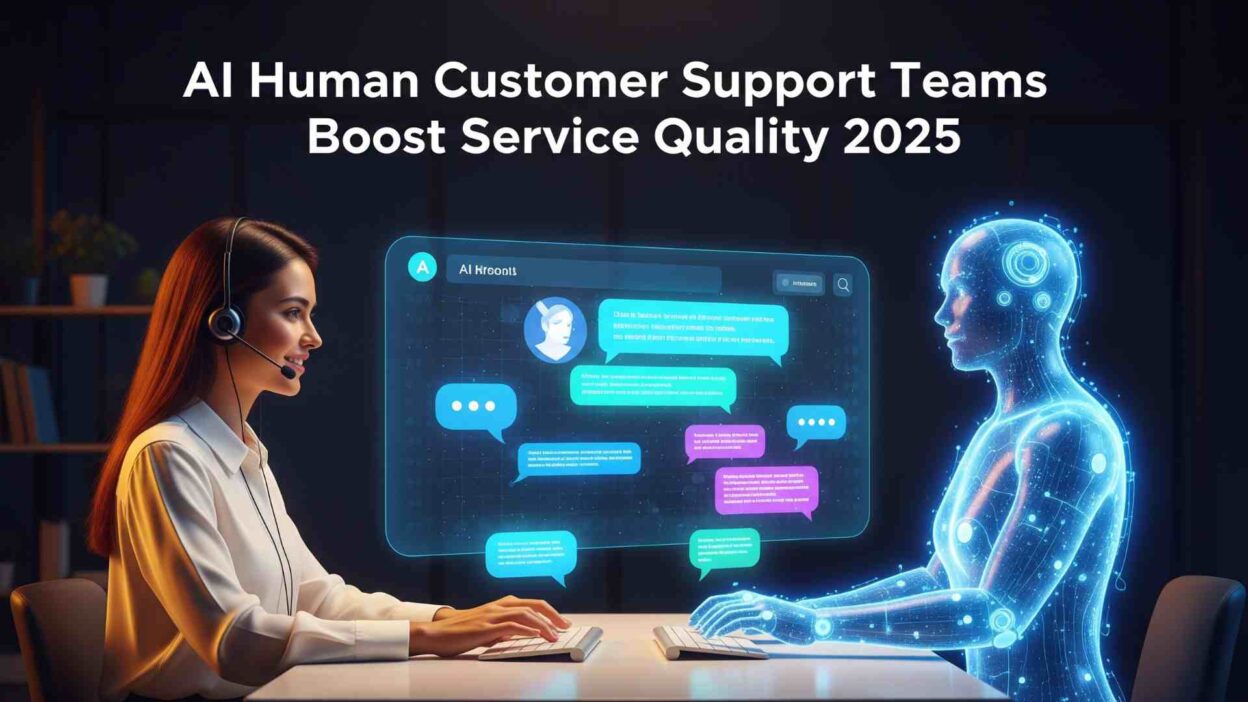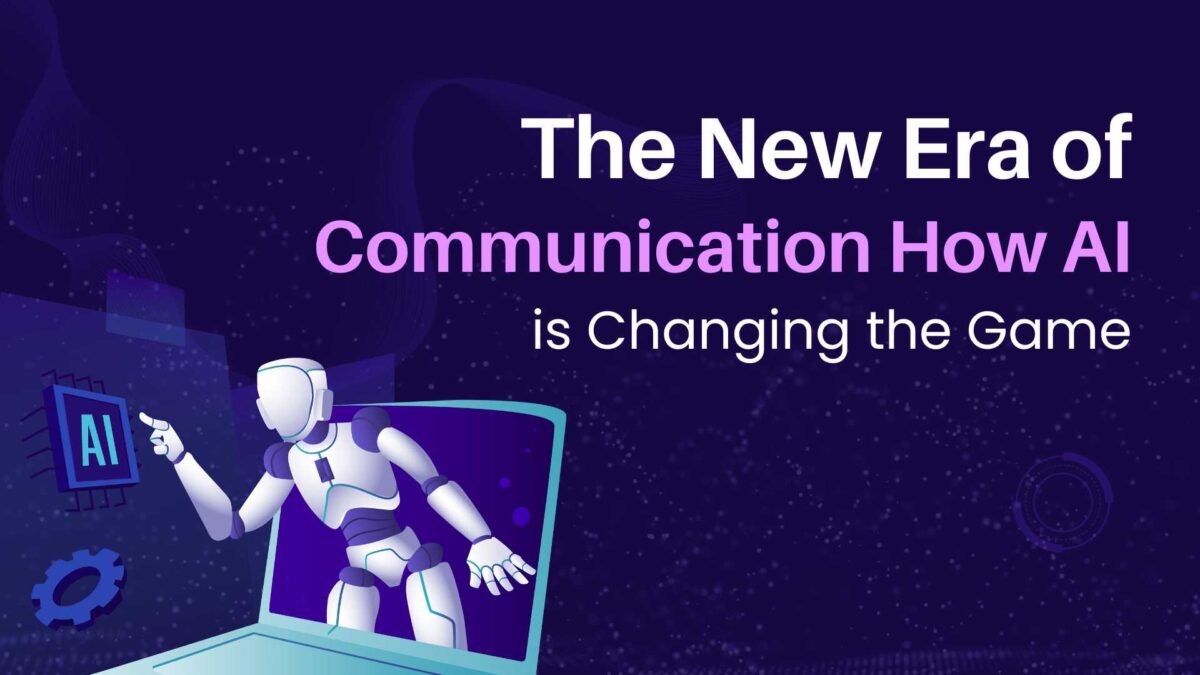TL;DR AI human customer support teams are revolutionizing how businesses serve their customers in 2025. By 2025, 95% of customer interactions will be powered by AI technology. This statistic reveals a dramatic shift happening right now in customer service departments worldwide.
Table of Contents
Customer expectations have reached unprecedented heights. People want instant responses. They demand personalized solutions. They expect round-the-clock availability. Traditional customer service models struggle to meet these growing demands. Smart businesses are discovering that combining artificial intelligence with human expertise creates the perfect solution.
Why AI Human Customer Support Teams Work Better
80% of companies are either using or planning to adopt AI-powered chatbots for customer service by 2025. This massive adoption rate shows businesses recognize the power of AI human customer support teams. These hybrid teams deliver results that neither AI alone nor humans alone can achieve.
Artificial intelligence excels at processing information quickly. It handles routine questions with lightning speed. AI systems work 24 hours a day without breaks. They maintain consistent service quality across thousands of interactions. However, AI lacks emotional intelligence. It cannot understand complex human emotions. It struggles with nuanced problems that require creative thinking.
Human agents bring irreplaceable qualities to customer service. They understand emotions and show genuine empathy. Humans excel at complex problem-solving. They can think creatively and adapt to unique situations. They build meaningful relationships with customers. Yet humans have limitations too. They need breaks and sleep and can get overwhelmed during peak periods. This cannot process information as quickly as AI systems.
Combining both creates AI human customer support teams that leverage the best of both worlds. AI handles the heavy lifting of routine tasks. Humans focus on complex issues that require personal touch. This collaboration creates superior customer experiences.
Speed Meets Empathy in Modern Support
Speed remains crucial in customer service success. 69% of consumers prefer to use AI-powered self-service tools for quick issue resolution. Customers appreciate getting instant answers to simple questions. AI chatbots provide immediate responses to common inquiries. They guide customers through basic troubleshooting steps. They collect preliminary information before transferring complex cases to human agents.
When human agents receive escalated cases, they already have complete context. The AI system provides customer history, previous interactions, and attempted solutions. This information allows human agents to jump straight into solving the real problem. Customers avoid repeating their stories multiple times. The entire process becomes more efficient.
Human agents can then focus on what they do best. They provide emotional support during frustrating situations and explain complex solutions in simple terms. This go above and beyond to ensure customer satisfaction. This combination creates experiences that customers remember positively.
Cost Reduction Without Quality Compromise
Business leaders worry about customer service costs constantly. Traditional models require large teams to handle peak periods. AI human customer support teams offer a smarter approach to cost management. AI systems handle high-volume, low-complexity requests automatically. This reduces the number of human agents needed for basic inquiries.
Companies save money on staffing costs. They reduce training time for new employees. They minimize human error in routine processes. These savings can be significant over time. However, the real value comes from maintaining service quality while reducing costs.
Human agents can handle more complex cases when AI takes care of routine work. This improves job satisfaction for customer service representatives. They spend time on meaningful problem-solving rather than repetitive tasks. Happy employees provide better customer service. This creates a positive cycle that benefits everyone involved.
Building Effective AI Human Customer Support Teams
Creating successful hybrid teams requires careful planning. Companies must understand their specific customer service needs. They need to identify which tasks AI can handle effectively. They must determine when human intervention becomes necessary. This analysis forms the foundation for building AI human customer support teams.
Technology integration presents the first challenge. Companies need AI systems that work seamlessly with existing customer service platforms. The AI should access customer databases instantly. It must integrate with communication channels like phone, email, and chat. The system should provide human agents with complete interaction history.
Staff training becomes equally important. Human agents need to understand how AI systems work. They must learn to interpret AI-generated insights. They should know when to override AI recommendations. Proper training ensures smooth collaboration between artificial and human intelligence.
Setting Up AI Workflows That Support Humans
Smart workflow design determines success in AI human customer support teams. AI should handle initial customer contact across all channels. It can greet customers, identify their needs, and provide immediate assistance for common issues. The system should know exactly when to escalate issues to human agents.
Escalation triggers need careful consideration. Complex technical problems should go to human experts immediately. Emotional customers often need human empathy right away. Billing disputes typically require human judgment and authority. Setting clear escalation rules ensures customers reach the right resource quickly.
The handoff process must be seamless. When AI transfers a case to a human agent, complete context should transfer too. The human agent should see all previous interactions, attempted solutions, and customer preferences. This continuity prevents customer frustration and improves resolution times.
Human agents need easy access to AI recommendations during complex cases. The AI system can suggest solutions based on similar past cases. It can provide relevant documentation and resources. It can even draft response templates that humans can customize. This support helps human agents work more effectively.
Training Teams for AI Collaboration
72% of customer experience leaders say they’ve provided adequate training for generative AI tools, but 55% of agents say they haven’t received any training. This gap reveals a critical challenge in building AI human customer support teams. Proper training ensures both AI systems and human agents work together effectively.
Training programs must cover technical skills and soft skills equally. Human agents need to understand AI capabilities and limitations. They should learn how to interpret AI insights and recommendations. They must know when to trust AI suggestions and when to use human judgment instead.
Soft skills training remains crucial for human agents in AI-enhanced environments. Empathy becomes even more valuable when AI handles routine interactions. Active listening skills help agents understand complex customer needs. Problem-solving abilities allow agents to tackle cases that stump AI systems.
Ongoing training keeps teams current with AI developments. Regular updates help agents use new AI features effectively. Feedback sessions identify areas where human-AI collaboration can improve. This continuous learning approach ensures AI human customer support teams evolve with changing customer needs.
Real Results from AI Human Customer Support Teams
Companies implementing hybrid customer service models report impressive results. Response times drop significantly when AI handles initial customer contact. Resolution rates improve as human agents focus on complex issues they can actually solve. Customer satisfaction scores increase as people get faster, more accurate assistance.
Cost savings often exceed expectations. Companies reduce staffing needs for routine inquiries while maintaining service quality. They minimize training costs for new employees handling basic questions. They decrease customer churn by providing better overall experiences.
Employee satisfaction frequently improves in AI human customer support teams. Human agents appreciate focusing on interesting, challenging work. They feel more valued when their uniquely human skills become the focus. Job satisfaction increases when repetitive tasks get automated away.
Measuring Success in Hybrid Support Models
Key metrics reveal the effectiveness of AI human customer support teams. First contact resolution rates typically improve significantly. AI systems provide human agents with better context and suggested solutions. This preparation allows agents to solve more problems during initial customer contact.
Average handling time often decreases for complex issues. Human agents spend less time gathering basic information and more time solving actual problems. AI systems provide relevant resources and similar case histories quickly. This support helps agents work more efficiently on challenging cases.
Customer satisfaction scores provide the ultimate measure of success. Customers appreciate getting quick answers to simple questions from AI systems. They value the personalized attention from human agents on complex issues. The combination creates positive experiences that build customer loyalty.
Employee engagement metrics also improve with AI human customer support teams. Agents report higher job satisfaction when focusing on meaningful work. Turnover rates often decrease as employees feel more valued and challenged. These improvements create additional cost savings for companies.
Common Challenges and Smart Solutions
Implementing AI human customer support teams presents several challenges. Technology integration can be complex and time-consuming. Staff resistance to AI adoption may slow progress. Customer acceptance of AI interactions varies widely. Addressing these challenges requires careful planning and clear communication.
Technology challenges often center on system integration. Legacy customer service platforms may not work seamlessly with modern AI tools. Data synchronization between different systems can cause delays and errors. Companies need robust technical planning to ensure smooth AI implementation.
Staff concerns about job security can create resistance to AI adoption. Clear communication about AI’s role as a support tool rather than replacement helps address these fears. Training programs that enhance human skills while incorporating AI tools build confidence. Involving staff in AI implementation planning creates buy-in and reduces resistance.
Overcoming Customer Hesitation About AI
Some customers remain skeptical about AI customer service. They prefer speaking with human agents for all issues and worry about AI systems misunderstanding their problems. This question whether AI can provide personalized service. Addressing these concerns requires transparent communication and gradual AI introduction.
Clear disclosure about AI involvement builds trust with customers. People appreciate knowing when they’re interacting with AI systems. They want easy options to reach human agents when needed. Transparent communication about AI capabilities and limitations sets appropriate expectations.
Gradual AI introduction helps customers become comfortable with hybrid service models. Starting with simple tasks like appointment scheduling or basic information requests builds confidence. As customers see AI effectiveness in routine matters, they become more accepting of AI assistance for other issues.
Providing immediate human escalation options reduces customer anxiety about AI interactions. Customers feel more comfortable trying AI assistance when they know human help remains easily accessible. This safety net encourages AI adoption while maintaining customer satisfaction.
The Future of Customer Service Teams
AI human customer support teams represent the future of customer service. Technology will continue advancing rapidly. AI systems will become more sophisticated and capable. However, human skills like empathy, creativity, and complex problem-solving remain irreplaceable. The most successful companies will master the balance between AI efficiency and human connection.
Emerging technologies will enhance AI human customer support teams further. Voice recognition improvements will make AI phone interactions more natural. Natural language processing advances will help AI understand customer emotions better. Machine learning developments will make AI recommendations more accurate and helpful.
Human roles will continue evolving in AI-enhanced environments. Agents will focus increasingly on complex problem-solving and relationship building. They will become AI collaboration experts who know how to leverage technology effectively. These enhanced roles will require continuous learning and skill development.
Customer expectations will continue rising as AI capabilities improve. People will expect instant responses to routine questions while demanding human empathy for complex issues. Companies that master AI human customer support teams will gain significant competitive advantages in this evolving landscape.
Preparing for Tomorrow’s Service Standards
Future customer service will blend AI efficiency with human creativity seamlessly. Predictive analytics will anticipate customer needs before problems arise. AI will proactively suggest solutions and schedule follow-up interactions. Human agents will focus on strategic relationship building and complex problem resolution.
Personalization will reach new levels through AI data analysis. Systems will understand individual customer preferences and communication styles. They will customize interactions based on past experiences and current context. Human agents will use these insights to provide truly personalized service experiences.
Integration across all customer touchpoints will become seamless. AI will maintain conversation context across phone, email, chat, and social media interactions. Human agents will have complete customer journey visibility regardless of communication channel. This omnichannel approach will create consistent, high-quality experiences everywhere.
Companies investing in AI human customer support teams today position themselves for future success. They develop expertise in human-AI collaboration that will become essential andbuild customer loyalty through superior service experiences. It create sustainable competitive advantages in an increasingly AI-driven business environment.
Read More: The Future of AI Call Assistants for Sales and Support
Conclusion

AI human customer support teams deliver the best customer service possible in 2025. They combine AI efficiency with human empathy to create exceptional experiences. Companies implementing these hybrid models see improved customer satisfaction, reduced costs, and increased employee engagement. The statistics clearly show this approach works better than AI-only or human-only customer service models.
Success requires careful planning and implementation. Companies must integrate technology thoughtfully while training staff effectively. They need to address customer concerns transparently while measuring results continuously. The effort pays off through better customer relationships and business results.
Smart businesses are already building AI human customer support teams for competitive advantage. They understand that the future belongs to companies that master human-AI collaboration.






[…] mobile access to customer information and company resources, employees can respond to client inquiries. Helps resolve issues more […]
[…] Read More: Teaming Up AI And Humans To Improve Customer Service […]
[…] multiple industries. Users prefer AI voices over traditional interfaces. The transformation from robotic to human voices […]
[…] system is probably one of the most obvious ways to provide automated customer service when learning how to automate customer service with voice AI. With automated ticketing systems integrated with voice AI, you can respond to customer requests […]
[…] Read More: Teaming Up AI and Humans to Improve Customer Service […]